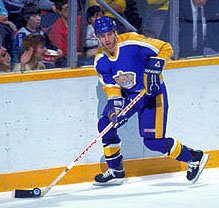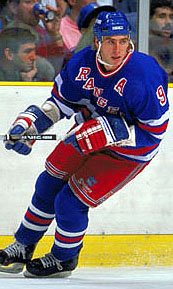
Ted Irvine was one of those hard working wingers who did a thankless job as a role player during the 1970s. As a result he was underrated by fans, but not by his teammates or hockey experts.
Born in Winnipeg Manitoba in December of 1944, Ted grew up playing many sports. He was active in baseball, tennis, football, track and swimming, but of course hockey was his true love.
By 1961 he joined the St. Boniface Canadians of the Manitoba Junior Hockey League. As a rookie he chipped in 6 goals and 13 points, but the following year he led the whole league in goals with 31 in just 32 games!. By 1963-64 he captained the Canadians, but wound up with the MJHL Winnipeg Braves by mid season.
A Boston Bruins prospect, Ted ended the 1963-64 season with a trial stint in the pros, including his first game in the National Hockey League!
Because the league was still a 6 team league, it was extremely difficult for players to break into the league until expansion finally came in 1967. As a result Ted spent the next 3 years in the minor leagues. All three years were spent in the CHL - one in Minneapolis and two in Oklahoma City. Ted won two successive CHL championships, and in 1965-66 led all playoff scorers with 6 goals!
Ted's big NHL break happened on June 6, 1967. That was the day of the NHL expansion draft, as the NHL's six new teams stockpiled their rosters with basically minor leaguers and role players from the Original Six teams. Ted was selected by the Los Angeles Kings, and his minor league days were over.
Ted brought his his hard hitting, spirited play to the Californian coast and was an instant hit. The press nicknamed him the "baby faced assassin," a great metaphor for his kamikaze style of bodychecking.
Ted and the Kings had two really good years to start off their NHL careers, but by year three the team was really struggling. Ted too wasn't having as strong a season. In order to help rectify the Kings poor season, Ted was traded to the New York Rangers in exchange for Real Lemieux and Juha Widing on February 28, 1970. Irvine played a strictly defensive role at first, but soon was placed on a line with Pete Stemkowski and Bruce MacGregor where he got more ice time.
In New York Ted was noted to do "The Irvine Shuffle" - a celebratory dance when he scored a goal. He was able to dance a career high 26 times in 1973-74. He also added 20 assists for a career high 46 points.
Ted spent the next 5 full seasons in the Big Apple. An outstanding team player, Ted was extremely popular off the ice too. In 1974 he received the hockey writers "Players Player Award." A year later he was honored with the NY Ranger team award for charitable work. The "Conacher Award" was given to him for his work with handicapped children.
In the summer of 1975 Ted was traded with Bert Wilson and Jerry Butler to the St. Louis Blues in exchange for Bill Collins and goalie John "JD" Davidson. It was with the Blues that Ted spent his final two NHL seasons.
For 10 NHL seasons Ted Irvine earned a reputation as a big and tough winger. Aggressive but disciplined, Irvine was a hard worker, particularly in the corners and along the boards. A well rounded player who played strong positionally, Irvine was not blessed with great skills. He had a good shot and a knack for scoring in clutch situations, but was a poor skater by NHL standards.
A couple of other interesting notes about Irvine: Ted, who in his early NHL years worked for the Canadian Liquor Commission during the off-seasons, is the father of professional wrestling superstar Chris Jericho.

Jericho - a quick witted fan favorite of WWF fans who has inherited his dad's nickname as the Baby Faced Assassin (although he's better known as Y2J), has early memories of hockey and his dad.
"I remember going to Madison Square Garden when I was five and getting mad because my dad wouldn't look up off the ice at me. And I always thought it was too loud. I pulled this little sweatshirt over my ears because I hated the cheering!" he said in a Jay Greenberg interview. " I remember all the other kids thought it was cool my dad played for the Rangers. But for me it was just my dad. I didn't understand what was going on in the game. Now, I look back on some of the things he accomplished and I'm proud."
Jericho was asked to describe his dad as a player:
"He was a fighter, kind of like a Cam Neely type power forward. He was 6 foot 2, 95 pounds and in 1970 that was a big player. In his best year he had 26 goals and 105 penalty minutes, pretty good numbers for even this day and age, and back then, things were different. He wasn't a star, but a very important player, like an Adam Graves. He played for a long time, 10 years. Today, he'd make $4 million a year!"
After the trade to St. Louis, Irvine retired as he didn't have the same zest for the game in the Gateway City.
"I just felt it was time," Irvine said. "Playing in New York was the epitome of hockey and after I got traded, it just wasn't the same."
Ted added: "Chris said, 'Dad, can you stay home and teach me Kung Fu?' so I did. It was his turn."
So could have Chris Jericho made a living as Chris Irvine - NHL hockey player?
"I wanted to be a hockey player at one point," Jericho says. "I was a grinder, a penalty killer, a checker, a Craig Berube, Mike Eagles kind of guy. I was okay, but wasn't NHL material, although now with 30 teams I could probably play for the Blue Jackets"
Jericho remains a big hockey fan, but it isn't quite the same as when he watched his dad play.
"There are no real characters anymore. Now everybody wears a helmet because of concussions and the game is a corporate business. The teams are kind of nameless and faceless. There are no Nick Fotius, Jerry Korabs, Dave Schultzes. And not that they had to be goons either. Guy Lafleur had the hair flowing, then he had no hair and then all of a sudden he had hair again. C'mon, what's up with that?! And Bobby Clarke had no teeth."
Ah the memories!
And what does dad, a religious man, think about his son's chosen line of work?
I don't like some of the things that go on in wrestling, but it's Chris's profession and I don't judge it. It's the path God chose for him and I know he makes up with a lot of good things that he does."
 Kelly Hrudey began his career in the NHL in 1983-84 after being drafted by the New York Islanders in the second round (38th overall) of the 1980 NHL Entry Draft. Kelly was a top prospect brought into replace the legendary Islander netminder Battlin' Billy Smith.
Kelly Hrudey began his career in the NHL in 1983-84 after being drafted by the New York Islanders in the second round (38th overall) of the 1980 NHL Entry Draft. Kelly was a top prospect brought into replace the legendary Islander netminder Battlin' Billy Smith. "I was there to ride the boat, basically," Kelly said. "I couldn't believe how fortunate I was to be a part of it."
"I was there to ride the boat, basically," Kelly said. "I couldn't believe how fortunate I was to be a part of it." "The game didn't come as easy or naturally as it once did. I knew that I had no interest in going anywhere else. I had no interest in leading the life of a gypsy. I have no feelings of sadness," he said in a conference call from his home in Canada when he announced his retirement. "I just cannot believe the opportunity I've had."
"The game didn't come as easy or naturally as it once did. I knew that I had no interest in going anywhere else. I had no interest in leading the life of a gypsy. I have no feelings of sadness," he said in a conference call from his home in Canada when he announced his retirement. "I just cannot believe the opportunity I've had."






